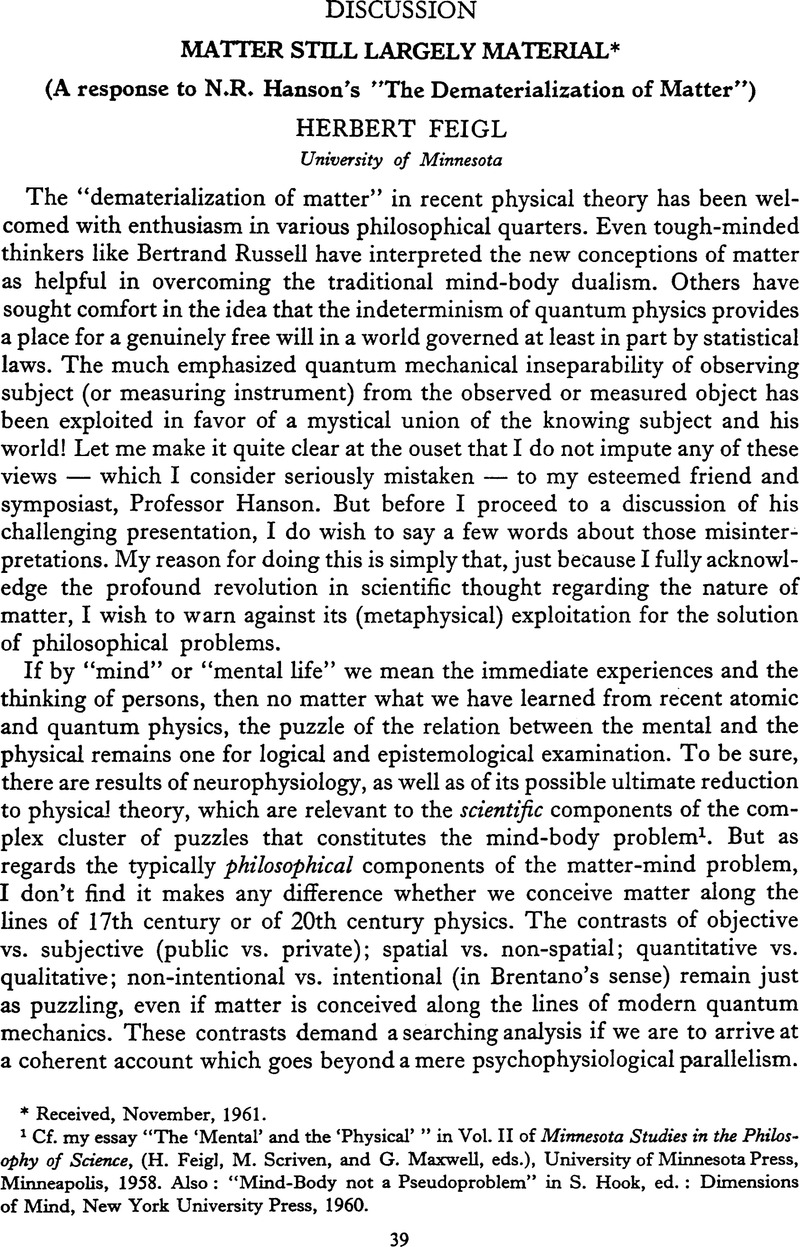Article contents
Matter Still Largely Material (A response to N.R. Hanson's “The Dematerialization of Matter”)
Published online by Cambridge University Press: 14 March 2022
Abstract

- Type
- Discussion
- Information
- Copyright
- Copyright © Philosophy of Science Association 1962
References
1 Cf. my essay “The ‘Mental’ and the ‘Physical’” in Vol. II of Minnesota Studies in the Philosophy of Science, (H. Feigl, M. Scriven, and G. Maxwell, eds.), University of Minnesota Press, Minneapolis, 1958. Also: “Mind-Body not a Pseudoproblem” in S. Hook, ed.: Dimensions of Mind, New York University Press, 1960.
2 Cf. R.E. Hobart (pseudonym for D.S. Miller), “Freewill as involving Determination, and inconceivable without it” Mind 43, 1934. University of California Associates, “The Freedom of the Will,” reprinted in H. Feigl and W. Sellars, eds., Readings in Philosophical Analysis, New York: Appleton-Century-Crofts, 1949. A. Grünbaum, “Causality and the Science of Human Behavior,” in N. Feigl and M. Brodbeck, eds., Readings in the Philosophy of Science, Appleton-Century-Crofts, New York, 1953. Also: Arthur Pap, “Determinism, Freedom, Moral Responsibility, and Causal Talk,” in: S. Hook, ed., Determinism and Freedom, New York University Press, 1958.
3 A.S. Eddington, The Nature of the Physical World, New York: Macmillan, 1932 A.H. Compton, The Freedom of Man, New Haven, Yale University Press, 1935. Even the highly sophisticated and more recent views of Hans Reichenbach, “The Freedom of the Will” in: Modern Philosophy of Science, The Humanities Press, N.Y., 1950. do not seem to me to carry conviction.
4 Cf. C.J. Ducasse, Nature, Mind and Death La Salle Illinois: The Open Court Publishing Company, 1951; chapter 15.
5 If I understand them correctly, R. Carnap in his work since his essay on “The methodological Character of Theoretical Concepts” (Minn. Studies in The Philosophy of Science, Univ. of Minn. Press, 1956, P.K. Feyerabend, in many publications, culminating in “Explanation, Reduction, and Empiricism,” forthcoming in Vol. III of Minn. Studies in the Philosophy of Science, Univ. of Minn. Press, 1962, and Wilfrid Sellars, “The Language of Theories,” in H. Feigh and I. Madewell, ads., Current Issues in the Philosophy of Science, Holt, Rinehart, and Winston, Inc., New York, 1961, are tending in this direction.
- 2
- Cited by


